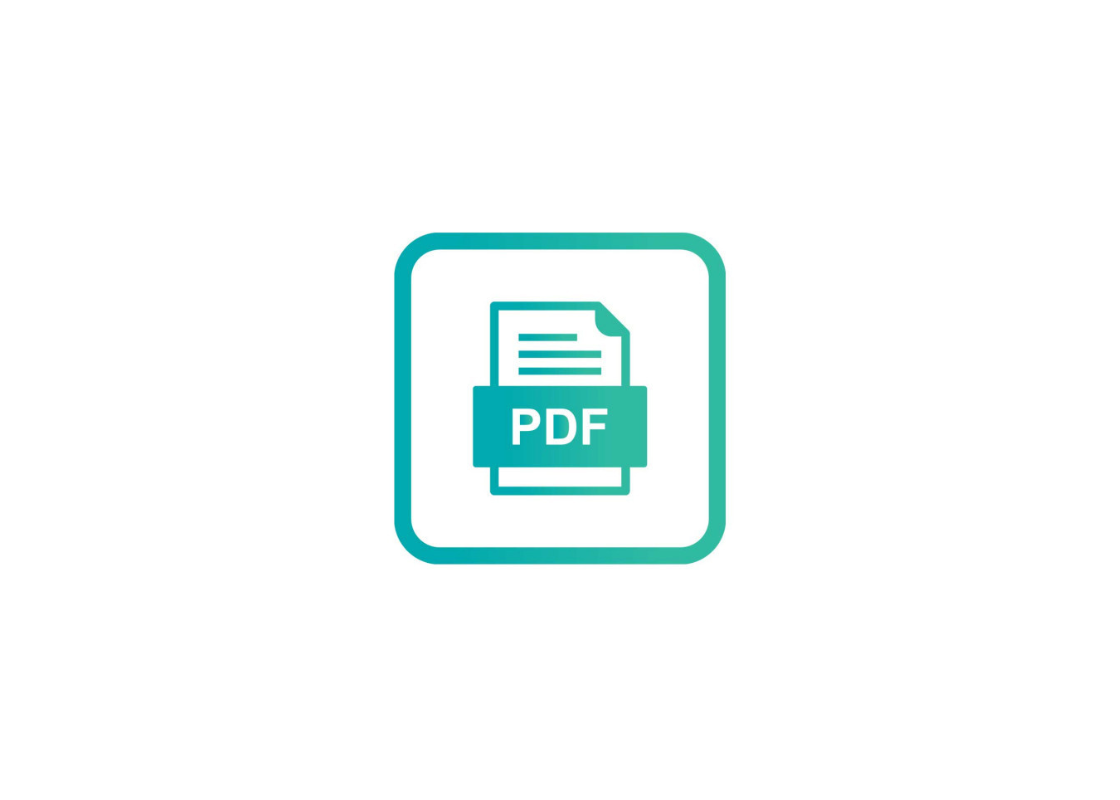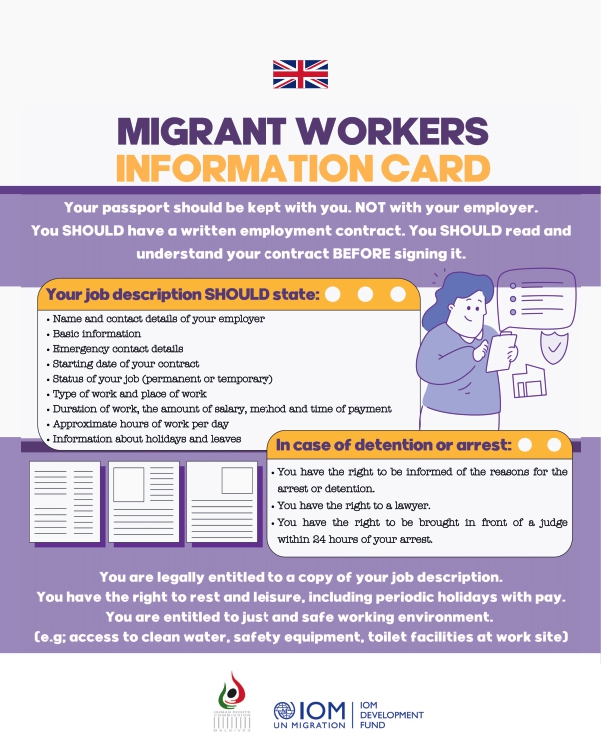Migrants
FAQ's
Migrants are people who are not citizens of Maldives, living or working in the Maldives.
The International Convention on the Protection of the Rights of All Migrant Workers and Members of Their Families defines migrant workers as “a person who is to be engaged, is engaged or has been engaged in a remunerated activity in a State of which he or she is not a national.”
No. However, the Universal Periodic Review has recommended Maldives to ratify this convention.
Universal human rights are inherent to all of us without any distinction of any kind such as race, colour, sex, language, religion, political or other opinion, national or social origin, property, birth or other status. Everyone enjoys basic human rights regardless of their immigration status.
The Constitution of the Republic of Maldives guarantees the rights outlined in the Chapter 2 of the Constitution to everyone without discrimination of any kind, including race, national origin, colour, sex, age, mental or physical disability, political or other opinion, property, birth or other status or native island. Under the Constitution, everyone is entitled to rights, in a manner that is not contrary to any tenet of Islam. These rights include:
• Equality before the law, right to equal protection and equal benefit of the law.
• Right to life, liberty and security of the person.
• Right to privacy.
• Freedom of thought and expression.
• Freedom to acquire and impart knowledge.
• Freedom to establish and participate in associations and societies.
• Right to form and or participate in trade unions.
• Freedom of peaceful assembly.
• Right to protect reputation and name.
• Right to marry and establish a family.
• Right to education.
• Right to just and safe conditions of work, fair wages, equal remuneration for work of equal value, and equal opportunity for promotion.
• Right to rest and leisure, including limits on hours of work and periodic holidays with pay.
• Right of pension as provided by law, for everyone engaged in employment.
• Right to participate in the cultural life of the nation.
• Right to fair and transparent public hearing.
• Right to fair lawful administrative action.
• Freedom from arbitrary detention, arrest, or imprisonment.
• Rights on arrest and detention as specified in the constitution and subordinating laws.
• Rights of the accused.
• Right to assistance of legal counsel.
• Right to appeal.
• Right to be treated with humanity and with respect for the inherent dignity of the human person, if they are deprived of liberty through arrest or detention.
• Right to compensation for arrest or detention without legal authority or justification.
• Right to not obey unlawful orders.
Rights can be limited by a law enacted by the People’s Majlis (Parliament) to any extent only if demonstrably justified in a free and democratic society.
Rights can be limited by a law enacted by the People’s Majlis (Parliament) to any extent only if demonstrably justified in a free and democratic society.
• Rights can be limited by a law enacted by the People’s Majlis (Parliament) to any extent only if demonstrably justified in a free and democratic society.
• Prohibition of forced employment.
• Non-discrimination.
• Prohibition of child labor.
• Right to an employment agreement between employer and employee.
• Right to a written job description.
• Prohibition of dismissal without reasonable cause.
• Notice period prior to dismissal, and dismissal without notice.
• Right to leave worksite after working hours and return to worksite for duty.
• Maximum working hours of 48 hours per week, with exceptions.
• Employees are entitled to 24 hours break for 6 consecutive days worked.
• Minimum 30-minute break for meal times, for working consecutively for 5 hours.
• A 15-minute break for prayer times.
• Employees are not required to work overtime unless agreed in the employment agreement.
• Overtime shall be paid 1 ¼ times hourly salary on a normal day, and 1 ½ times hourly salary for Fridays and public holidays.
• Employees are entitled to 30 days of paid annual leave upon completion of one year of employment.
• Not working when on paid leave.
• Employees are entitled to 30 days of paid sick leave per year of employment.
• Employees are entitled to 10 days of paid Family Responsibility Leave to attend to important obligations such as tending to family members during illness.
• Female employees are entitled to 60 days of paid maternity leave.
• Male employees are entitled to 3 days of paternity leave from the date of the birth of a child.
• Upon expiry of paid maternity leave, the employed mother or father may take a maximum of 1 year of unpaid leave.
• Female employees upon completion of maternity leave are allowed 2 daily breaks of 30 minutes each to attend to the child until the child is of 1 year of age.
• Each employee is entitled to 5 days of paid leave for circumcision of a child.
• Employer has the discretion to pay Ramadan allowance to Muslim Expatriate workers.
• Businesses in the tourism industry shall collect 10% service charge, and service charge has to be distributed equally among all employees.
• Statement of salary to be provided by the employer.
Further, the Regulation on Employment of Foreign Workers in the Maldives (Regulation No. 2021/R-16) specifies the process and guidelines for issuance of work permits, regularization, and employment of expatriates in the Maldives.
Grievance mechanisms are established for any instance of:
• Violation of Employment Act.
• Forced employment.
• Discrimination.
• Unfair dismissal or disciplinary measures.
• Non-payment of wages.
• Not providing a salary statement.
• Contravention of job agreement.
• To appeal a decision made by the Minister of Economic Development regarding a case against a recruitment agency.
• Violations under the Employment Act against recruitment agencies.
• Violation of training agreement or on-the-job training agreement as per the Employment Act.
• Disagreements regarding orders to ensure Occupational Safety and Health.
• Unfair disciplinary actions.
Every employee has the right to be protected from any harm or torture. If your employer is abusing their power, you have every right to lodge a complaint against your employer to Labour Relations Authority or Employment Tribunal.
If you are deprived from any of these rights, approach Labour Relations Authority (LRA) or can directly file a complaint at Employment Tribunal. Ministry of Economic Development can assist you in obtaining health insurance through your employer and ensure safe accommodation as well.
No, your passport shall be kept with you at all times.
Even if you are arrested or detained, you still are entitled to the basic rights. You shall have the opportunity to be presented equally before the law, right to equal protection and equal benefit of the law, right to fair and transparent public hearing, freedom from arbitrary detention, arrest, or imprisonment, right to assistance of legal counsel, right to appeal, right to be treated with humanity and with respect for the inherent dignity of the human person, if they are deprived of liberty through arrest or detention and right to compensation for arrest or detention without legal authority or justification.
Public Interest Law Centre provides free legal advice on violations of employment and human rights to migrant workers. At the time of arrest, you are entitled to get legal assistance from Maldives Police Services, and at the time of detention, Maldives Immigration is to provide legal assistance for you.
Mission for migrant workers Maldives and Society for Health Education provides mental health assistance.
They are all entitled to the same rights as local children in the Maldives. Right to non-discrimination, right to education, right to health care, protection from exploitation are some of the basic rights.
No. Social assistance provided by the state is specifically for citizens of the Maldives. However, in times of crises, Maldives Red Crescent does provide social services to migrants.
Work visas and passports are issued by Maldives Immigration. Both documents are necessary by Maldivian law to enjoy the right to freedom of movement. Hence, if your work visa or passport is expired, you can apply to Maldives Immigration to renew your documents.


